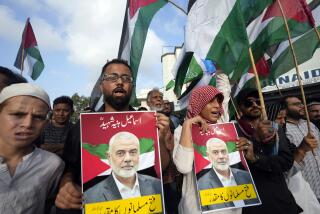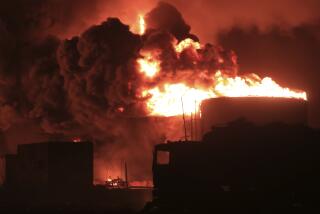Yemen president capitalizes on his political wits
Yemeni President Ali Abdullah Saleh is as relentless as he is cunning, promising to step aside yet remaining very much in power even after nearly a year of deadly rebellion has edged his impoverished nation to the brink of implosion.
Bearing the scars from an assassination attempt last year, Saleh, who has transferred duties to his vice president, still holds an uncanny sway over the country he has ruled for 33 years. He has been maneuvering for his son and nephews to retain control of Yemen’s military and security agencies, and last week he startled many by canceling a trip to the U.S. for medical treatment.
Saleh has deftly, if erratically, manipulated Yemen’s multiplying dangers. But since November, when he signed an agreement backed by Washington and Saudi Arabia to cede power, his attention has focused on escaping prosecution and consolidating his family’s grip on key institutions. The opposition accused him over the weekend of using sleight-of-hand ploys to again sidestep his promise to step down.
Pressure on his government has increased because of the growing influence of the Islamist party, Islah, a leading voice in labor unrest and dissident movements. At the same time, Al Qaeda militants are assassinating his security officials and battling his army in southern towns in a conflict that has left the U.S. concerned about the expansion of terrorism in the Arabian Peninsula.
Saleh, a former tank commander who survived a rocket attack on his compound in June, has proved more resilient than his toppled contemporaries, including the late Moammar Kadafi in Libya and Egypt’s Hosni Mubarak. He can leave the country, as he did to recuperated in Saudi Arabia for months, and return to even more bloodshed and political disarray, yet somehow stay a step ahead of his enemies.
Yemen’s many threats and Saleh’s mercurial gambits have made the nation unique in the revolts that have swept the Arab world over the last year. Protesters face more than a stubborn despot. Their rallying cries have been subsumed by struggles involving larger forces, including mutinous soldiers, rival tribes, a secessionist movement in the south and sporadic war between security forces and rebels in the north.
The nation, which often seems at the brink of bursting, as it did in the 1994 civil war, appears inured to conflict like a well-armed dysfunctional family that has learned to share a battered house. But many now suggest the momentum against Saleh is too daunting for him to survive.
“Saleh has resisted stepping down for the last year and every time he’s agreed to a deal he’s broken his promise,” said Jamal Anam, an opposition member. “But the president will not be able to stop the wheel of change. Saleh will become more and more isolated.”
The transfer of power agreement was expected to ease tension. The pact called for Saleh to hand authority to Vice President Abdu Rabu Mansour Hadi in preparation for a presidential election next month. Saleh has vowed that once a new president, widely expected to be Hadi, is in place, he will formally step down in exchange for immunity from prosecution. This proviso has angered hundreds of thousands of protesters demanding Saleh’s arrest.
“The signing of the deal did not satisfy the demonstrators in the streets,” said Ali Saif Hassan, an analyst and head of the Political Development Forum. “The West has to think more creatively to pressure for a national dialogue. It can convince political forces by freezing their assets and bank accounts.”
Saleh’s maneuvering since the deal has left Yemenis and the international community at times feeling whiplashed. His announcement last month about plans to travel to the U.S. caught many in Yemen off guard.
The proposal put Washington in the sensitive predicament of possibly offering refuge to a reviled autocrat who also has been a U.S. ally in fighting Al Qaeda. But Saleh, as he often does to keep his opponents exasperated, reversed himself Saturday, suggesting his absence would imperil stability at a time Islah is plotting to paralyze state offices.
There were also indications Saleh would not be treated with the pomp the U.S. usually gives a head of state. Ahmed Sofi, the president’s spokesman, said Saleh made “compromises and sacrifices” to Washington by agreeing to step down and “if President Obama or a high-ranking official in the U.S. won’t receive him, we do not want to go.”
The deepening political tumult in Yemen is a sign of Islah’s attempt to strike at the core of Saleh’s power. The Islamist organization, which is intent on creating an Islamic state that would certainly run counter to U.S. interests, has instigated unrest in federal and local government agencies. Seizing on national anger over public corruption, Islah has called for the firing of school principals and top government officials.
The strategy threatens to roil the military and intelligence establishments controlled by Saleh’s family. It is an indication that the politically shrewd Saleh may be finding it difficult to counter elements more powerful than hundreds of thousands of peaceful demonstrators.
Employees at the September 26 newspaper, a mouthpiece for the military, have demanded the resignation of Ali Shatar, chief editor and head of Moral Guidance, an agency with the Defense Ministry. The manager of state-controlled Yemen TV and several of his executives were forced to flee their offices after fistfights broke out between workers and a production manager over graft.
Islah, the country’s main opposition party, has been moving to steer the protest movement. It competes in Change Square, the epicenter of anti-Saleh sentiment in Sana, the capital, with socialists, students, nationalists, tribes, Houthi rebels and others in what represents an often violent mosaic of dissent.
Saleh has often warned that Islah is a front for a dangerous brand of radicalism. He has repeatedly played on fear of Islamic extremism, especially resonant in the West, as a way to enhance his power. However, Saleh critic Hassan Zaid, head of an opposition party, also warned recently that “the world will be surprised when Al Qaeda, the militant wing of the Islah, controls Yemen.”
Among Islah’s more prominent personalities are the ultraconservative Sheik Abdul Majeed Zindani, a henna-bearded cleric who is considered a terrorist by the U.S. and was once a spiritual mentor to Osama bin Laden, and defector Gen. Ali Mohsen Ahmar, whose 1st Armored Division has clashed with Saleh loyalists in the capital. But the group also has less radical members such as Tawakul Karman, a human rights activist who shared the 2011 Nobel Peace Prize.
The neighborhoods around Saleh’s palace in Sana have been carved up by warring factions, including one funded by a billionaire telecommunications tribesman and another led by Saleh’s son, Ahmed, commander of the Republican Guard. Artillery blasts and power blackouts are common. On Sunday, Saleh’s forces shelled a neighborhood, killing three people.
“Saleh will ultimately be forced to leave the country, but not now,” said Ahmed Zurqah, a political analyst. “He has to make sure his family and the political loyalists around him are not harmed and the nation doesn’t shatter.”
Times staff writer Fleishman reported from Cairo and special correspondent Al-Alayaa from Sana.
More to Read
Sign up for Essential California
The most important California stories and recommendations in your inbox every morning.
You may occasionally receive promotional content from the Los Angeles Times.











